A Good Day’s Work for a Good Day’s Pay
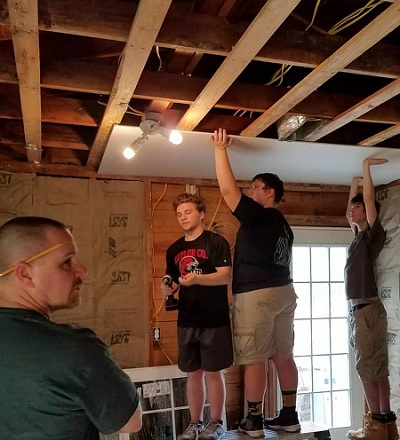 Not everyone believes in a good day’s work for a good day’s pay. Honest, hard-working people do. Others work as little as possible for their pay.
Not everyone believes in a good day’s work for a good day’s pay. Honest, hard-working people do. Others work as little as possible for their pay.
Good employees give a good day’s work for a good day’s pay.
Those employees:
- Work the number of hours expected
- Take breaks only during break time
- Work well with others
- Show respect to everyone
- Never cheat the boss
They put their hands to the plow and get the job done. A few employees work more than required for good measure.
On the other side of the coin, good bosses give a good day’s pay for a good day’s work.
Those employers:
- Pay a fair wage
- Do not overwork employees
- Allow time for regular breaks and emergency leave
- Provide worker training
- Never act high and mighty
- Respect and never cheat employees
A few employers pay more than expected for good measure.
Money is not always the greatest reward for hard work.
These youth team members from Campbellsville Baptist Church worked hard on their mission trip. They received no money. However, they did experience the joy of helping others. No amount of money can buy that feeling.
As 2020 begins:
- Work hard and well if you work for someone.
- Pay well and fairly if someone works for you.
- Help someone in need.
“The work of their hands brings them reward” (Proverbs 12:14 NIV).
Thanks to Bonnie Alley for the suggestion and to Jenny Burgess for the photo.
Do you have an expression you want explained? If so, please comment below.
Subscribe to receive my weekly posts by email and receive a free copy of “Words of Hope for Days that Hurt.”
If you enjoyed this post, please share it with your friends.
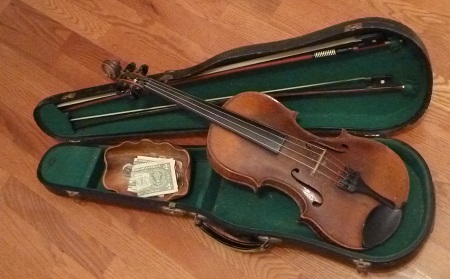 A friend’s father often said, “The one who dances has to pay the fiddler.” That makes sense. We live with the consequences of the choices we make.
A friend’s father often said, “The one who dances has to pay the fiddler.” That makes sense. We live with the consequences of the choices we make. If dogs get wet, stand back. We don’t want to be too close when they shake off the water. However, we can learn from their actions.
If dogs get wet, stand back. We don’t want to be too close when they shake off the water. However, we can learn from their actions. Joseph C. Ives explored the Grand Canyon and Colorado River region in 1857 and 1858. He thought it was nothing to write home about. Although he admired the scenery,
Joseph C. Ives explored the Grand Canyon and Colorado River region in 1857 and 1858. He thought it was nothing to write home about. Although he admired the scenery, 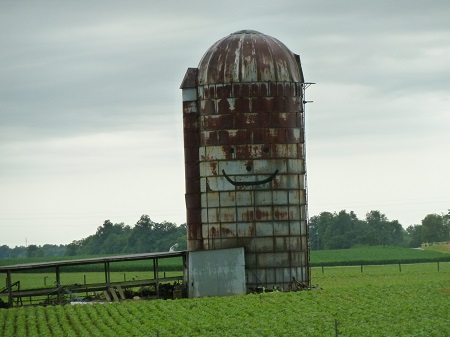 I remember the first time I saw this silo. It looked like it would burst with joy. A freshly painted smiling face greeted every passing traveler.
I remember the first time I saw this silo. It looked like it would burst with joy. A freshly painted smiling face greeted every passing traveler. Recently a cousin wrote, “Our roots run deep and are closely intertwined.” She meant our family has a long and strong history of close relationships. We may not see one another often, but our ties remain. We can depend on mutual love and support.
Recently a cousin wrote, “Our roots run deep and are closely intertwined.” She meant our family has a long and strong history of close relationships. We may not see one another often, but our ties remain. We can depend on mutual love and support. Liberty, Kentucky’s Veterans Memorial Park includes three walls with names of local veterans. A Liberty Bell replica stands at the entrance and a fountain in the center. American flags line the back wall.
Liberty, Kentucky’s Veterans Memorial Park includes three walls with names of local veterans. A Liberty Bell replica stands at the entrance and a fountain in the center. American flags line the back wall.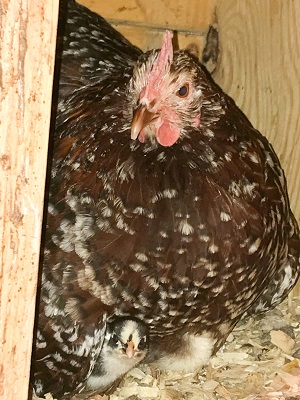 When a storm approaches, a mother hen gathers her baby chicks under her wing. She wants to keep them safe.
When a storm approaches, a mother hen gathers her baby chicks under her wing. She wants to keep them safe.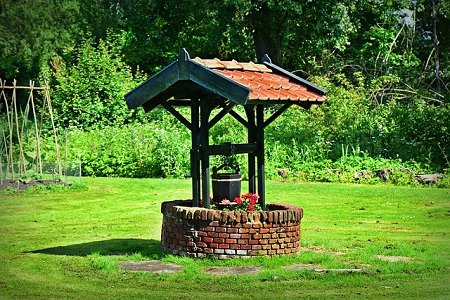 As a little girl, I loved to visit relatives who had a well with a bucket. The bucket was tied to the end of a rope. To get water, we had to:
As a little girl, I loved to visit relatives who had a well with a bucket. The bucket was tied to the end of a rope. To get water, we had to: A few years ago, my husband was in the hospital, not expected to live. The next day a doctor said he was much better but not out of the woods yet. He meant my husband still had to fight for his life.
A few years ago, my husband was in the hospital, not expected to live. The next day a doctor said he was much better but not out of the woods yet. He meant my husband still had to fight for his life.